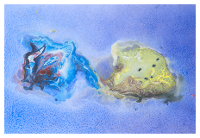Speaker
Alexandr Bylinkin
(ITEP Institute for Theoretical and Experimental Physics (RU))
Description
The dependence of the spectral shape of produced charged hadrons on the size of a colliding system is discussed using a two-component model. As a result, the system-size hierarchy in spectral shape is observed. Next, a hydrodynamic extension of a two-component model for hadroproduction using recent theoretical calculations is suggested to describe the spectra of charged particles produced in heavy-ion collisions in the full range of transverse momenta pT. Data from heavy-ion collisions measured at the Relativistic Heavy Ion Collider and the Large Hadron Collider are analyzed using the introduced approach and are combined in terms of energy density. The observed regularities might be explained by the formation of a quark-gluon plasma during the collision.
Finally, the quenching of hadron production spectra in terms of number of participants (Npart) and number of collisions (Ncoll) is discussed using the two-component model.
Summary
First part of the talk is published recently in Phys.Rev.C:
http://journals.aps.org/prc/abstract/10.1103/PhysRevC.90.018201
Author
Alexandr Bylinkin
(ITEP Institute for Theoretical and Experimental Physics (RU))
Co-authors
Andrei Rostovtsev
(ITEP Institute for Theoretical and Experimental Physics (RU))
Ms
Nadezda Chernyavskaya
(ITEP)
